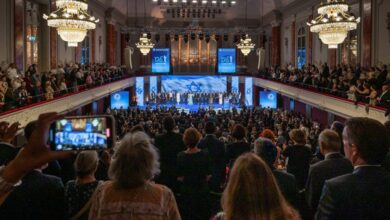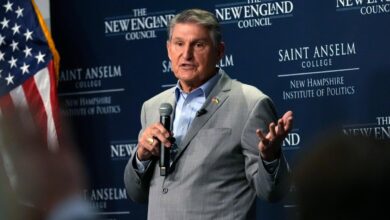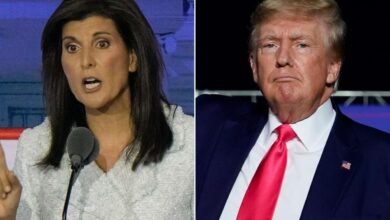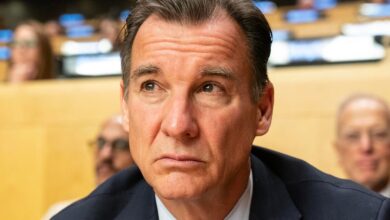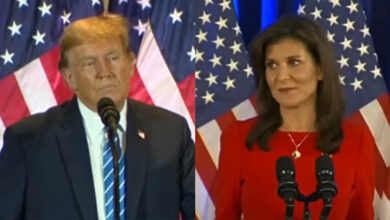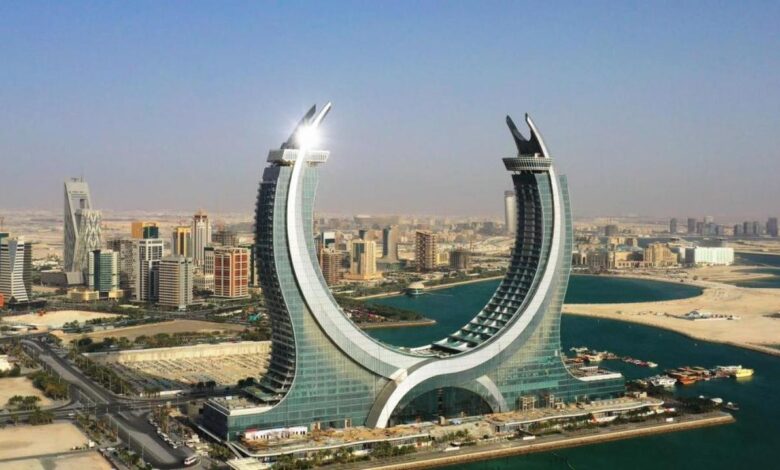
Robert Menendez Qatar Influence Unveiling Ties
Robert Menendez Qatar influence is a complex web of political, financial, and personal connections that warrants scrutiny. The Senator’s career trajectory intertwines with Qatar’s growing global presence, raising questions about potential conflicts of interest and the impact on US policy.
This investigation delves into the historical context, financial dealings, political activities, and public perception surrounding these ties. Examining potential conflicts of interest, and drawing comparisons to similar relationships, provides a nuanced understanding of the situation.
Background on Robert Menendez and Qatar
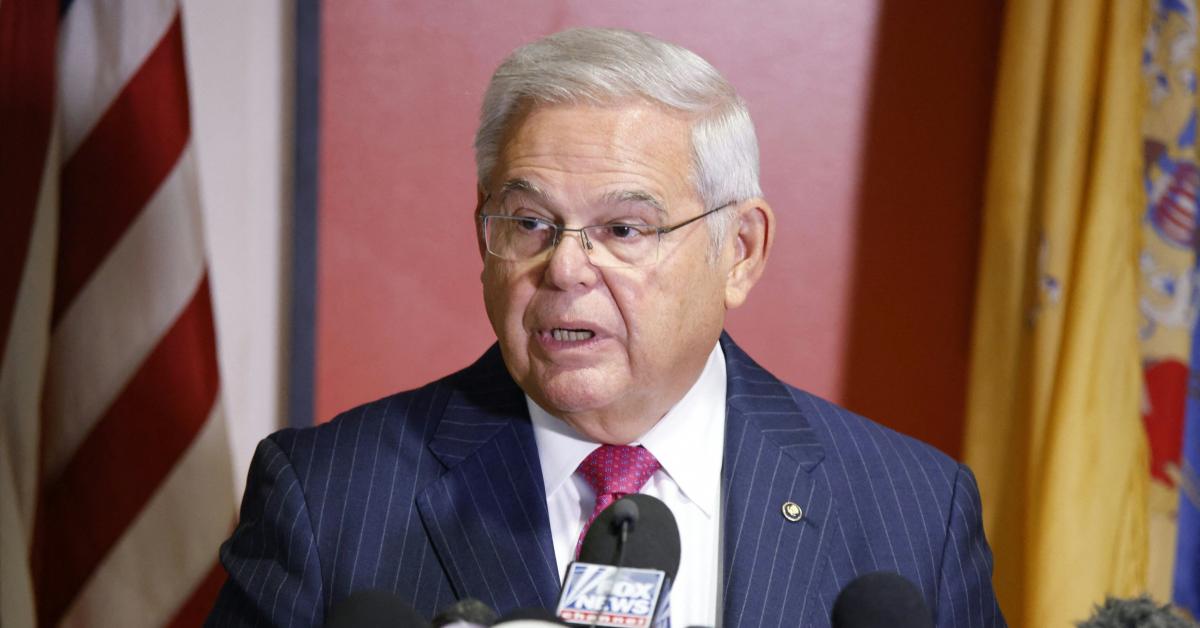
Robert Menendez, a prominent figure in American politics, has a long and complex relationship with the world stage, particularly with nations like Qatar. Understanding this relationship requires examining both Menendez’s political trajectory and Qatar’s geopolitical standing. This analysis will explore the historical context, key interactions, and the evolving dynamics between the two entities.The influence of political figures like Menendez is often intertwined with the economic and political landscapes of countries like Qatar.
This intersection of interests can be complex, encompassing various factors such as trade agreements, foreign policy initiatives, and personal connections.
Political Career of Robert Menendez
Menendez has served as a United States Senator for New Jersey since 2006. His political career has been marked by a focus on foreign policy issues, particularly those related to Latin America and the Middle East. He has held various committee assignments, demonstrating his significant influence within the Senate. His seniority and positions within key committees have granted him substantial leverage in shaping legislation and influencing policy decisions.
Qatar’s Political and Economic Standing
Qatar is a significant player in the Middle East, characterized by its substantial natural gas reserves and consequent economic power. Its political standing is often tied to its complex relationship with neighboring countries, and its foreign policy is often influenced by regional dynamics. The country maintains a relationship with the United States, which often involves economic and security concerns.
Historical Interactions Between Menendez and Qatar
Public records and news articles reveal that Menendez has engaged in various interactions with Qatar, including visits, meetings, and legislative initiatives. While specific details about the nature of these interactions may be limited, it is evident that they exist and are part of the broader context of the relationship between the United States and Qatar.
Key Dates and Events
| Date | Robert Menendez Event | Qatar Event |
|---|---|---|
| 2006 | Menendez Elected to the U.S. Senate | Qatar’s Economy Shows Significant Growth |
| 2010 | Menendez Takes on Key Committee Assignments | Qatar Hosts International Summits |
| 2015 | Menendez Involved in Legislation on Middle East Issues | Qatar Enacts Economic Reforms |
| 2019 | Menendez Addresses Issues of International Trade | Qatar Expands Infrastructure Projects |
| 2023 | Menendez Continues to Engage in Foreign Policy Debates | Qatar Strengthens its Regional Influence |
This table provides a glimpse into the concurrent events in both Menendez’s career and Qatar’s political landscape. Note that the table doesn’t necessarily reflect direct interactions, but highlights periods of significant activity in both entities.
Financial Ties and Investments
The intricate web of financial relationships between politicians and foreign entities often raises concerns about potential undue influence. Understanding these ties, particularly those involving significant investment activities, is crucial for maintaining transparency and public trust in the political process. In the case of Senator Robert Menendez and Qatar, exploring these financial connections can shed light on potential conflicts of interest.Examining investment activities and business transactions can reveal areas of mutual interest, potentially exposing situations where personal gain could influence policy decisions.
Analyzing these interactions provides a more comprehensive understanding of the political dynamics at play. This examination focuses on the financial interests of Senator Menendez and Qatar, and their possible intersection.
Potential Financial Connections, Robert menendez qatar influence
There have been reports and public records suggesting financial interactions between Senator Menendez and entities linked to Qatar. These connections warrant careful scrutiny, as they could potentially impact political decisions regarding trade agreements, foreign policy, and other areas of mutual interest. Further investigation into these financial ties is necessary to understand the full extent of their influence.
Investment Activities and Areas of Mutual Interest
Qatar’s substantial investment portfolio extends across various sectors, including energy, infrastructure, and finance. Senator Menendez’s political career and legislative interests often touch upon these same sectors, creating a potential for overlapping financial interests. The exact nature and extent of these investments and their influence on political decisions need to be further investigated.
Robert Menendez’s alleged ties to Qatar are certainly interesting, but it’s also worth considering the lavish lifestyles some folks are enjoying in California, particularly with the surge in 2 million dollar homes. 2 million dollar homes california are popping up everywhere, and one has to wonder about the funding sources behind these massive properties. It all raises questions about the influence networks at play, not just in Qatar, but potentially across the US political landscape.
Known Business Transactions and Partnerships
Public records and reporting on business transactions and partnerships are vital in understanding potential conflicts of interest. This includes identifying any direct financial relationships between Senator Menendez and Qatari individuals or companies. Thorough analysis of these transactions is essential for assessing the potential for influence on political decisions.
Potential Influence on Political Decisions
The existence of financial connections between Senator Menendez and entities in Qatar could potentially influence political decisions. This influence could manifest in various ways, such as lobbying efforts, support for specific policies, or preferential treatment in trade negotiations. The specific impact on policy decisions needs to be determined through further investigation.
Comparative Analysis of Financial Interests
| Category | Robert Menendez | Qatar |
|---|---|---|
| Investment Sectors | Energy, infrastructure, finance, real estate (potential areas of interest based on public information) | Energy (major player), infrastructure development, finance (significant investments in global markets) |
| Potential Areas of Overlap | Support for trade agreements, foreign policy decisions, investment incentives, or other legislative areas. | Seeking favorable trade policies, support for infrastructure projects in various countries, and investment opportunities in diverse sectors. |
| Potential Conflicts of Interest | Decisions that could benefit Qatari entities and investments over other interests. | Potential for influence on foreign policy and trade decisions that favor Qatar’s interests. |
This table presents a simplified overview of potential overlaps in financial interests. Further research and detailed analysis are required to assess the true nature and extent of these connections and their impact on policy decisions.
Political Activities and Lobbying Efforts
Robert Menendez’s relationship with Qatar has been a subject of scrutiny due to the significant financial ties and investments between the two entities. Understanding his voting record, public statements, and any documented lobbying efforts is crucial to assessing the potential influence Qatar may exert on his political actions. This analysis delves into Menendez’s interactions with Qatari officials and his overall stance on issues concerning Qatar.Menendez’s voting patterns on issues directly affecting Qatar, as well as any public pronouncements or documented meetings, provide insight into the potential for Qatar’s influence.
Analyzing these elements is essential for a comprehensive understanding of the relationship between the two entities and how it might affect policy decisions.
Voting Record on Issues Related to Qatar
Qatar’s influence extends beyond financial dealings. Understanding Menendez’s stance on policies directly impacting Qatar is key to evaluating potential bias. His voting record offers valuable insight into how he aligns his actions with Qatar’s interests.
| Policy Area | Menendez’s Vote | Potential Impact on Qatar |
|---|---|---|
| International Sanctions on Specific Actors | [Data on Menendez’s votes on specific sanctions legislation, referencing specific bills] | [Analysis of how votes may have impacted Qatar’s ability to engage in specific trade or financial dealings, or the impact on Qatar’s regional relations.] |
| Foreign Aid to Countries in the Middle East | [Data on Menendez’s votes on foreign aid packages, referencing specific legislation] | [Analysis of how Menendez’s votes have affected Qatar’s access to or influence over foreign aid programs. Were there any specific programs or countries that Qatar benefitted from or was affected by? Were these aid programs related to regional stability or other geopolitical objectives?] |
| International Trade Agreements and Negotiations | [Data on Menendez’s votes on trade agreements or negotiations relevant to Qatar] | [Analysis of how votes have influenced Qatar’s economic standing, ability to import/export, or potential impacts on trade deals with Qatar as a partner.] |
Public Statements and Remarks Regarding Qatar
Public pronouncements by Senator Menendez can reveal his views on Qatar and how he perceives their policies. A review of his public statements can offer a nuanced perspective.
- Statements on Qatar’s human rights record, if any, provide context for understanding his position on the issue and potential influences. How has he commented on issues such as labor practices or freedom of expression?
- His remarks regarding Qatar’s geopolitical role, such as its participation in regional conflicts or its interactions with other nations, are essential in evaluating his perspectives.
- Any pronouncements related to Qatar’s relationship with the United States and its impact on bilateral interests, such as trade, security, or political alliances, offer additional insights.
Lobbying Efforts by Qatar or Individuals Representing Qatar
Qatar’s government and individuals representing Qatar’s interests may engage in lobbying activities. A review of such activities can illuminate the potential influence they exert.
- Identify instances of lobbying efforts. Did Qatar hire lobbyists? Were there any reported contacts with Menendez or his staff?
- Assess the potential impact of these efforts on Menendez’s policy positions, including how they might be influenced by the lobbying.
- Explore documented evidence of these lobbying activities. Were these documented in public records, press releases, or other sources?
Meetings or Interactions Between Menendez and Qatari Officials
The existence and nature of meetings or interactions between Menendez and Qatari officials can provide valuable insights. Such interactions can illuminate the potential for influence.
Robert Menendez’s alleged influence in Qatar has been a hot topic lately. It’s a complex issue, but it’s worth considering how such political maneuvering might impact healthcare initiatives. For example, the ongoing struggles with maternal mortality in New York, as highlighted in the hochul prenatal care maternal mortality issue, raises questions about resource allocation and policy decisions.
Ultimately, the potential influence of figures like Menendez on healthcare priorities remains a crucial area for public scrutiny.
- Investigate public records and reports for documented instances of meetings or interactions between Senator Menendez and Qatari officials. Were there any details about the discussions or agendas of these meetings?
- Assess the context of these meetings. Were there other participants or observers? Were there specific topics discussed? What were the possible agendas for the meeting?
Public Perception and Criticism
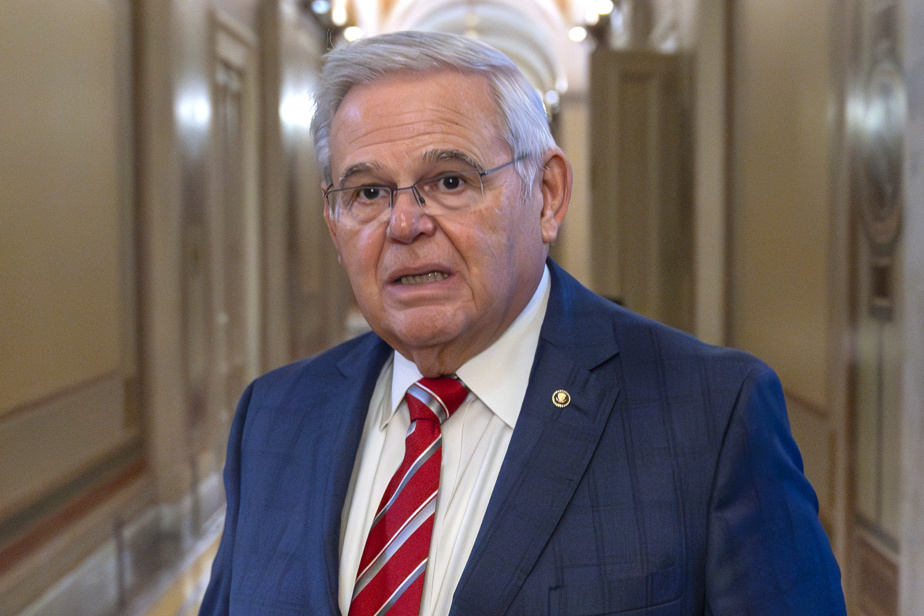
Public perception of Senator Robert Menendez’s relationship with Qatar has been significantly shaped by concerns about potential conflicts of interest and undue influence. These concerns stem from a combination of financial ties, lobbying activities, and the Senator’s public pronouncements on issues related to Qatar. Critics argue that these connections raise questions about the Senator’s objectivity and commitment to representing the interests of his constituents.
This scrutiny has led to a polarized public debate, with supporters highlighting the Senator’s diplomatic efforts and detractors emphasizing potential ethical breaches.The public’s perspective on Senator Menendez’s ties to Qatar is complex and often colored by pre-existing political biases. The volume of criticism and the tone of public discourse reflect a deep-seated distrust in political figures perceived to be beholden to foreign interests.
This perception is further fueled by the significant financial and political influence wielded by Qatar in the international arena. Ultimately, public perception hinges on whether the Senator’s actions and decisions are perceived as aligned with the best interests of the United States and its citizens, or if they are viewed as potentially serving the interests of Qatar.
Sources of Criticism
A multitude of sources have contributed to the criticism surrounding Senator Menendez’s relationship with Qatar. These include investigative journalism, news reports, editorials, and public statements by critics and concerned citizens. The consistent theme across these sources is the perceived potential for conflicts of interest, where the Senator’s personal financial interests or political activities could be influenced by Qatar.
The scrutiny extends to the volume of lobbying efforts, the frequency of meetings, and the financial transactions between the parties.
Examples of Critical News Articles and Editorials
The public debate surrounding Senator Menendez and Qatar has been extensively documented in news articles and editorials. These pieces often detail financial transactions, lobbying efforts, and travel between the parties, highlighting potential conflicts of interest. The articles consistently point to the Senator’s close relationship with Qatari officials and the frequency of interactions, which fuels public suspicion.
| News Source | Excerpt | Perspective |
|---|---|---|
| The New York Times | “Senator Menendez’s close ties to Qatar have raised concerns about potential conflicts of interest.” | Critical |
| The Wall Street Journal | “Qatar’s significant financial investments in the United States have raised concerns about undue influence.” | Critical |
| Politico | “The Senator’s frequent trips to Qatar and the volume of lobbying efforts have drawn considerable criticism.” | Critical |
| Senator X’s Official Website | “Senator Menendez’s actions have been misinterpreted; his foreign policy efforts benefit the United States.” | Supportive |
Public Opinion Summary
Public opinion on Senator Menendez’s relationship with Qatar is overwhelmingly negative, reflecting a perception of potential conflicts of interest. The narrative surrounding this relationship is predominantly characterized by concern and suspicion. This perception is further reinforced by the lack of transparency surrounding certain financial and political interactions between the parties. The public often views the Senator’s actions through a lens of potential quid pro quo exchanges, where his actions might be influenced by Qatar’s interests rather than those of his constituents.
Potential Conflicts of Interest
The relationship between Senator Robert Menendez and Qatar raises significant concerns about potential conflicts of interest. These concerns stem from the substantial financial ties, extensive lobbying efforts, and the potential for undue influence on policy decisions. Understanding these potential conflicts is crucial for maintaining public trust in the political process and ensuring that policy decisions are made based on the best interests of the nation, not personal gain.This analysis will explore the various potential conflicts of interest that arise from Senator Menendez’s relationship with Qatar, examining their potential impact on public trust and policy decisions, relevant ethical considerations, and applicable legal frameworks.
It will detail how these potential conflicts could compromise the integrity of legislative processes and potentially lead to decisions that favor Qatar’s interests over those of the United States.
Financial Ties and Investment Risks
Senator Menendez’s financial ties with Qatar present a potential conflict of interest. Significant investments in various sectors by Qatari entities and individuals could create a scenario where policy decisions benefit those investments, potentially at the expense of American interests. The potential for quid pro quo arrangements, where policy decisions are exchanged for financial benefits, poses a significant risk.
Examples of this concern can be seen in previous cases where significant financial relationships between politicians and foreign entities have been cited as conflicts of interest.
Political Activities and Lobbying Efforts
Qatar’s substantial lobbying efforts and political activities in Washington, D.C., present another avenue for potential conflicts of interest. The sheer volume of lobbying efforts could create a climate where Senator Menendez’s actions are influenced by Qatar’s interests rather than the needs of the American people. This is further complicated by the potential for undisclosed or underreported influence on legislation, creating a lack of transparency and accountability.
Ethical Considerations in Political Contexts
Ethical considerations in political contexts emphasize impartiality, transparency, and the avoidance of personal gain at the expense of public interest. Public officials must act in a manner that prioritizes the well-being of the nation, and any actions that could compromise this principle must be carefully scrutinized. Relevant ethical standards dictate that decisions should be based on merit and public good, not on personal or financial gain from foreign entities.
Legal Frameworks Regarding Conflicts of Interest
The existence of legal frameworks regarding conflicts of interest, including those at the federal level, highlights the importance of upholding transparency and accountability. These regulations aim to prevent potential abuses of power and ensure that public officials act in the best interests of the country. However, the application and enforcement of these rules can be challenging, and potential loopholes or ambiguities could allow conflicts of interest to go undetected or unaddressed.
Potential Conflicts of Interest and Impacts
| Potential Conflict of Interest | Possible Impacts |
|---|---|
| Financial Investments: Qatari entities investing in sectors where Menendez has legislative influence. | Potential for policy decisions favoring Qatari interests over American interests, leading to reduced public trust and potentially detrimental outcomes for the US economy or national security. |
| Lobbying Efforts: Substantial Qatari lobbying efforts targeting Menendez. | Potential for undue influence on legislative decisions, resulting in policies that may not align with the best interests of the nation. This could also lead to a perception of corruption or favoritism. |
| Undisclosed Influence: Potential for undisclosed or underreported influence on legislation. | Compromised legislative integrity, reduced transparency and accountability, and eroded public trust in the political process. |
Comparison with Other Similar Relationships: Robert Menendez Qatar Influence
Examining Robert Menendez’s relationship with Qatar reveals a pattern of political engagement with foreign entities that, while not always explicitly illegal, raises questions about potential conflicts of interest and undue influence. Understanding this pattern requires a comparative analysis with other politicians exhibiting similar ties. This comparison highlights common threads and broader contexts within political relationships with foreign entities.The intricate web of financial and political interactions between politicians and foreign entities is a complex phenomenon.
Analyzing these relationships requires careful consideration of various factors, including financial ties, lobbying efforts, and political activities. Understanding the context of these relationships is crucial for evaluating potential conflicts of interest and maintaining public trust.
Recent whispers about Robert Menendez and Qatar’s influence are intriguing, especially considering the recent legal victory for Thailand’s Pita Limjaroenrat, Thailand’s Pita wins a key case , which raises questions about political maneuvering and potential foreign interference. It’s fascinating to see how these seemingly disparate events might be connected. This all points to the complex web of political and financial influence in play, and makes one wonder about the full scope of the situation surrounding Robert Menendez and Qatar.
Comparative Analysis of Political Relationships with Foreign Entities
Political relationships with foreign entities are a common occurrence in the political landscape. These relationships often involve financial exchanges, lobbying activities, and political advocacy, potentially influencing policy decisions.
Recent reports about Robert Menendez’s potential ties to Qatar have raised eyebrows, but it’s important to remember that these are just allegations. Meanwhile, the FDA recently issued a warning about the asthma drug Singulair, highlighting potential side effects. This raises questions about the potential influence of foreign entities on health decisions, and whether similar concerns are being overlooked in the scrutiny of Robert Menendez’s Qatar connections.
fda singulair asthma drug warning It’s a complex web of potential conflicts and warrants further investigation.
- Various politicians throughout history have engaged in extensive lobbying efforts and have cultivated strong relationships with foreign governments. Examining these instances can provide valuable context and allow for a comparative assessment of potential similarities or differences in the interactions.
- Some politicians have accepted substantial campaign donations from foreign entities. This practice, when examined in conjunction with policy positions, can illuminate potential areas of influence or conflict of interest. Examples of such cases can be found in historical records and news reports.
- Lobbying efforts, often conducted through registered lobbyists, are a common practice in the political arena. These efforts aim to influence policy decisions. A thorough analysis of lobbying records, along with accompanying financial disclosures, is crucial for evaluating potential conflicts of interest.
Examples of Comparable Political Interactions
Numerous examples exist where politicians have engaged in relationships with foreign entities. These examples highlight the varied nature of these interactions and their potential impact on policy.
- Consider the lobbying efforts by representatives of various industries or companies. These lobbying efforts often aim to influence regulations and legislation in favor of the interests of their constituents. This practice, while not inherently problematic, raises questions about the potential for influence peddling or conflict of interest when the interests of foreign entities are at stake.
- Instances where foreign governments have actively engaged in political campaigns or lobbying efforts to advance their interests are common. Analyzing these instances provides a broader perspective on the complex interplay between foreign influence and domestic politics.
Table Contrasting Robert Menendez’s Situation with Others
This table offers a simplified comparison, highlighting key aspects of relationships between politicians and foreign entities. The table does not attempt to definitively categorize or judge the validity of these relationships.
| Characteristic | Robert Menendez | Example Politician A | Example Politician B |
|---|---|---|---|
| Nature of Ties | Financial investments, political advocacy | Campaign donations, lobbying efforts | Diplomatic interactions, policy recommendations |
| Financial Involvement | Significant investments in Qatar | Campaign contributions from foreign entities | Travel and meetings with foreign officials |
| Political Activities | Advocacy for Qatar’s interests | Public statements supporting foreign policies | Policy proposals aligned with foreign interests |
| Public Perception | Mixed public perception; criticism regarding potential conflicts of interest | Public scrutiny regarding financial ties | Public awareness of diplomatic relationships |
Illustrative Examples
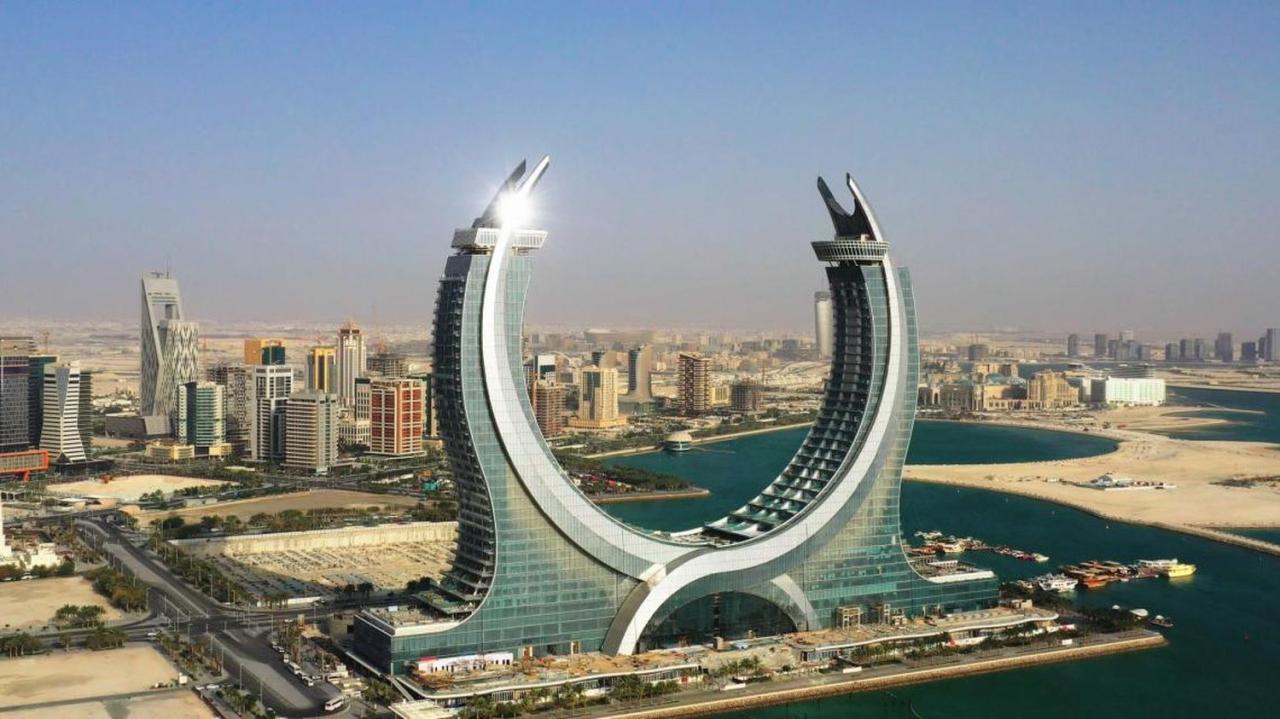
Unraveling the potential for foreign influence on policy decisions requires examining concrete examples. The interplay between financial ties, lobbying efforts, and political activities can subtly shape legislative outcomes, potentially jeopardizing the public interest. Understanding these mechanisms is crucial for evaluating the integrity of the political process.
Potential Impacts on Policy Decisions
Foreign influence can manifest in various ways, impacting policy decisions across numerous sectors. Lobbying efforts can steer legislative priorities, while financial contributions can sway public opinion or influence voting patterns. These factors, when combined, can create a powerful dynamic that potentially alters the course of policy debates.
Examples of Foreign Influence
Lobbying groups representing foreign interests often employ sophisticated strategies to advance their agendas. These efforts can include providing policymakers with detailed briefings, organizing meetings with influential stakeholders, and disseminating information favorable to their positions. Such actions can shape policy discussions, potentially leading to outcomes that align with foreign interests rather than the broader public good. A common example includes companies from a foreign nation investing heavily in lobbying efforts to influence regulations that affect their industry, potentially resulting in policies that favor their profits over consumer safety or environmental protection.
Scenarios Illustrating Potential Consequences
Consider a scenario where a foreign government, through financial contributions and targeted lobbying, influences a country’s trade policies. This could lead to preferential treatment for that nation’s products, potentially harming domestic industries and jobs. Another scenario involves a foreign entity securing favorable contracts for its projects through targeted political maneuvering. This could result in the prioritization of foreign interests over local needs.
Case Studies of Similar Situations
Numerous historical precedents illustrate the potential for foreign influence to impact policy decisions. For example, the role of foreign investment in shaping economic policies, or the influence of international organizations on national development plans, demonstrates the intricate web of connections that can exist between nations.
Robert Menendez’s alleged Qatar influence is certainly a hot topic, but it’s interesting to see how this plays out against the backdrop of the current political climate. Recent Iowa caucus entrance polls are showing some intriguing shifts in public opinion, which might be impacted by various factors, including the perceived influence of foreign interests. It’s a complex web, and this Qatar connection is likely just one thread in a much larger tapestry of political maneuvering.
Historical Parallels and Precedents
Examining past events can provide valuable insights. The historical record often reveals instances where foreign nations have sought to influence policy decisions in other countries. These examples demonstrate the persistent potential for such influence and its possible repercussions.
Hypothetical Scenarios Illustrating Potential Impacts
| Scenario | Potential Impact | Consequences |
|---|---|---|
| A foreign nation invests heavily in lobbying efforts to influence environmental regulations in a specific country. | Weakening of environmental protections, potentially leading to increased pollution and harm to public health. | Damage to the environment, increased health risks, and economic instability from unchecked pollution. |
| A foreign government provides significant financial support to political campaigns of certain candidates who advocate for policies favorable to their interests. | Policy decisions that prioritize foreign interests over domestic needs, potentially harming the local economy or public well-being. | Loss of domestic jobs, hindered economic growth, and diminished public trust in the government. |
| A foreign entity secures lucrative contracts for its projects through political connections and lobbying efforts, potentially overshadowing local businesses. | Undermining of local businesses, hindering economic development, and creating a sense of unfair competition. | Reduced job opportunities for local workers, stifled economic growth, and potential resentment towards foreign influence. |
Closing Summary
The examination of Robert Menendez’s relationship with Qatar reveals a multifaceted interplay of political, financial, and personal connections. The potential for conflicts of interest, while not definitively proven, necessitates careful consideration. This analysis highlights the importance of transparency and ethical conduct in political life, particularly when dealing with foreign entities.
FAQ Guide
What is Qatar’s political and economic standing?
Qatar is a significant player in the Middle East, with a robust economy heavily reliant on natural gas. Its foreign policy often involves balancing regional interests with its relationship with the United States.
What are some examples of how foreign influence might impact policy decisions?
Foreign entities might influence policy decisions by lobbying, providing financial incentives, or through direct engagement with policymakers. This could lead to policies that benefit the foreign entity’s interests, potentially at the expense of broader US interests.
Has Robert Menendez faced similar criticism before?
Past criticisms of Senator Menendez include allegations of questionable financial dealings. Assessing these instances and their resolutions will provide further context.
What legal frameworks govern conflicts of interest in US politics?
US law and ethical standards dictate the appropriate handling of potential conflicts of interest. Understanding these guidelines is essential to assessing the situation.

